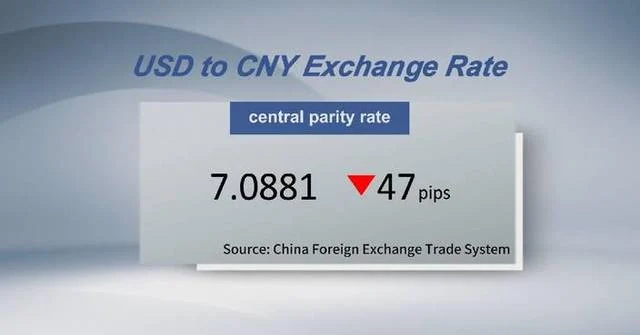Chinese yuan strengthens to 7.0881 against USD Monday

The central parity rate of the Chinese currency renminbi, or the yuan, strengthened 47 pips to 7.0881 against the U.S. dollar Monday, according to the China Foreign Exchange Trade System.
In China’s spot foreign exchange market, the yuan is allowed to rise or fall by 2 percent from the central parity rate each trading day.
The central parity rate of the yuan against the U.S. dollar is based on a weighted average of prices offered by market makers before the opening of the interbank market each business day.
Chinese yuan strengthens to 7.0881 against USD Monday
An author from China’s Taiwan region toured Shenyang City of northeast China’s Liaoning Province to research the story of a man named Wu Sihan who traveled from Taiwan to Chongqing in the mainland in the 1940s to support the Chinese People’s War of Resistance against Japanese Aggression (1931-1945).
In the summer of 2025, a film crew from China Global Television Network (CGTN) spent 20 days accompanying the writer Lan Bozhou as he traced the footsteps of Wu Sihan.
Originally Wu Tiaohe, Wu Sihan was born in 1924 during the Japanese occupation of Taiwan. He was an outstanding student who received his school’s highest awards. In 1943, he left Taiwan to study in Japan, dreaming of earning a professional qualification and returning to the mainland. After less than a year in Japan, in December 1943, 19-year-old Wu Sihan decided to give up his studies and travel back to China to fight alongside the Chinese people in their War of Resistance Against Japanese Aggression.
Following Taiwan’s restoration in 1945, Wu Sihan recounted his wartime experience in an article, “1,000 Miles in Search of the Motherland”.
In 1950, he sacrificed his life trying to advance the island’s liberation.
In 1987, Lan first heard the name Wu Sihan in an interview with Lin Shuyang, the longest-serving political prisoner in Taiwan. Since then, he has been researching this young Chinese patriot’s remarkable, inspirational and ultimately tragic story, which had been forgotten by history.
“Wu Sihan left Japan in 1944. He reached Shenyang by way of Dandong on April 6 or 7. There, he took the train to Xinmin Station. Today, the station square feels quite desolate. Imagine how alone he must have felt. Yet his article about his trip to his motherland reveals no such feeling. Instead, he describes his sense of anticipation and being filled with hope for the future. He stayed with Wu Jizhong, who’d been studying at Tokyo’s First Higher School. They planned to go on to Chongqing together,” Lan said.
Lan talked to the local people in Shenyang’s Xinmin City and looked for the relatives of Wu Sihan’s friend Wu Jizhong, trying to explore more details related to Wu Sihan.
“It was his connection to Wu Jizhong that brought Wu Sihan to Xinmin. He’d met Wu Jizhong in Japan, by chance. As compatriots living under colonial rule, they were probably drawn together. Based on their shared experience, they understood and supported each other,” Lan said.
Taiwan author retraces footsteps of young patriot during WWII





